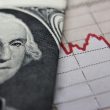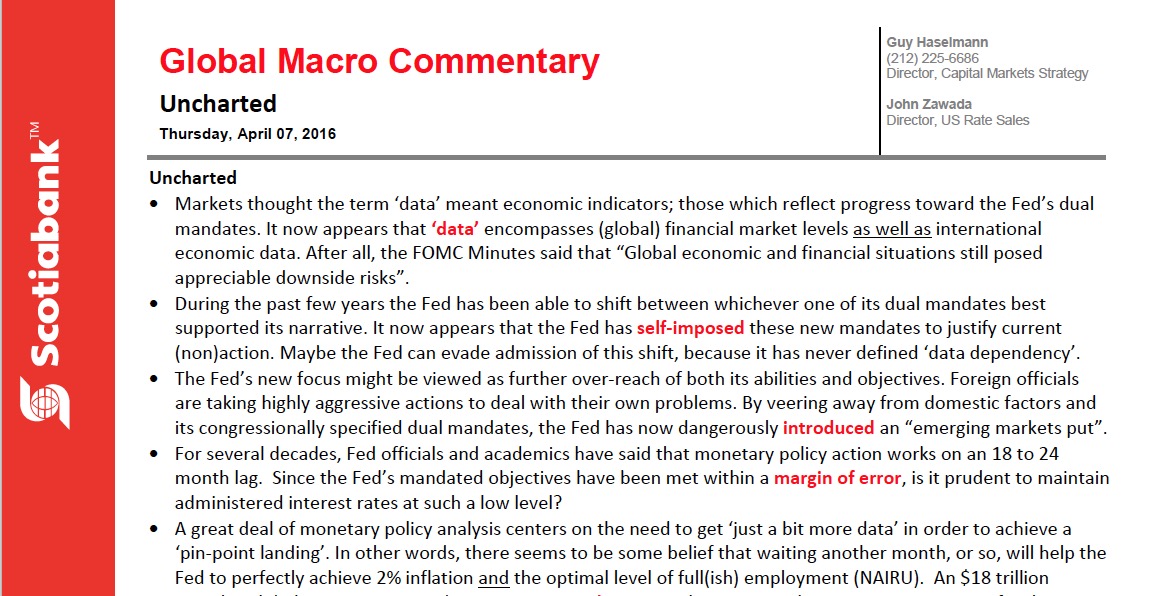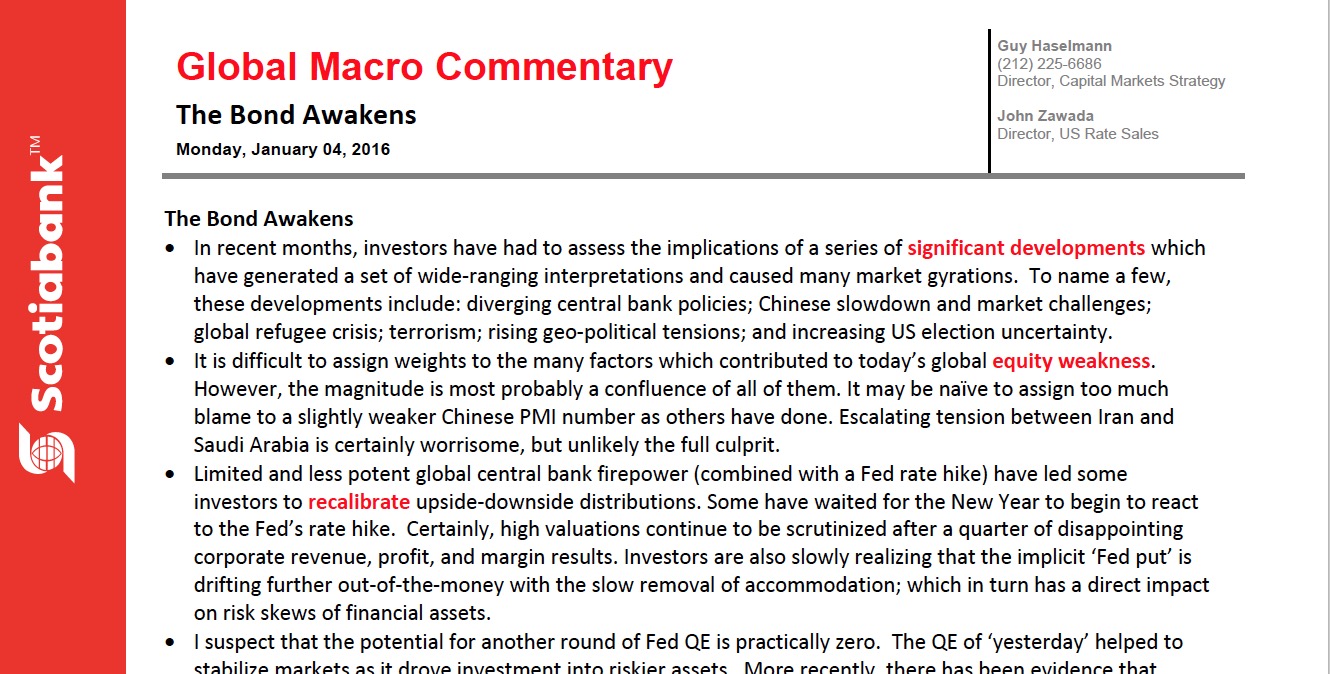Uncharted
by Guy Haselmann, Director, Capital Markets Strategy, Scotiabank GBM
• Markets thought the term ‘data’ meant economic indicators; those which reflect progress toward the Fed’s dual mandates. It now appears that ‘data’ encompasses (global) financial market levels as well as international economic data. After all, the FOMC Minutes said that “Global economic and financial situations still posed appreciable downside risks”.
• During the past few years the Fed has been able to shift between whichever one of its dual mandates best supported its narrative. It now appears that the Fed has self-imposed these new mandates to justify current (non)action. Maybe the Fed can evade admission of this shift, because it has never defined ‘data dependency’.
• The Fed’s new focus might be viewed as further over-reach of both its abilities and objectives. Foreign officials are taking highly aggressive actions to deal with their own problems. By veering away from domestic factors and its congressionally specified dual mandates, the Fed has now dangerously introduced an “emerging markets put”.
• For several decades, Fed officials and academics have said that monetary policy action works on an 18 to 24 month lag. Since the Fed’s mandated objectives have been met within a margin of error, is it prudent to maintain administered interest rates at such a low level?
• A great deal of monetary policy analysis centers on the need to get ‘just a bit more data’ in order to achieve a ‘pin-point landing’. In other words, there seems to be some belief that waiting another month, or so, will help the Fed to perfectly achieve 2% inflation and the optimal level of full(ish) employment (NAIRU). An $18 trillion complex global economy cannot be micro-managed so precisely, so as to achieve economic nirvana for the US and the international economic community. In the past, the Fed under Paul Volcker acted according to a set monetary policy plan, and did not base its decisions on “data” that was often proved immaterial.
• The Fed has done a masterful job keeping risk assets aloft while the economy slowly mends from financial crisis wounds. Unfortunately, and as I said in my “Cart Before the Horse” note, “If the real economy is strong then asset prices should rise to the appropriate level, not vice versa”. At some point the economic fundamentals must justify valuations and it looks like they are failing miserably. Revenues and profits have been falling for 4 quarters.
• Fiscal and regulatory policies have, no doubt, conspired to hurt central bank efforts, but extreme monetary actions alone do not fix any root causes of economic ailments. Actually, monetary policy that is too aggressive is counter-productive. As a case in point, negative rates appeared to have backfired in Japan (e.g., panicked the consumer). In addition, asset bubbles have historically not ended well.
• Despite all these factors, the Fed should raise rate ASAP. Delaying normalization elevates future troubles because monetary policy addresses short-term cyclical problems, not structural long-run issues. Focus on short-term benefits completely ignores issues such as aggregating indebtedness. Most proceeds from debt issuance have been used for share buybacks, rather than cap-ex. Boosting shares in this manner only gives the illusion that all is well. Greater levels of future profits will have to be earmarked for servicing the interest expense. Higher interest rates will only increase these liabilities further (an interesting paradox).
• Furthermore, delaying rate normalization suggests that the Fed severely lacks confidence that past actions have been sufficient to right the ship. If by luck or by chance policy action to date has been sufficient, then the Fed is ignoring the lagged effects of monetary policy action. Either outcome is not good for risk assets.
• Many argue that the central bank-inspired (extraordinary) rise in asset prices has widened inequality, simply because the wealthy own financial assets. Regardless of argument, at a minimum, many people feel that the rich are benefiting the most. There is a populist feeling that Washington is taking care of themselves and their rich friends. Even for those who believe that it is Fed policy that is enabling fiscal stalemate, the end result is still a benefit to the rich due to higher asset prices.
• This sense of ‘feeling left behind’ is the basis for Peggy Noonan’s interesting article (Here). The Panama Papers have further aggravated this same anger; now the belief that global ‘elites’ are using hidden conduits in the international financial system to stash their fortunes at the expense of the taxpayer. The Papers not only focus attention on the super-rich, but reveal forms of money-laundering, terrorism financing, and sanction evasion. Tax evasion and tax ‘fairness’ has been, and will remain, a central issue in the US election cycle.
• Modern society makes this anger particularly combustible for social tensions, because people no longer compare their lives with those of their neighbors. Social media like Facebook facilitates comparison with people’s most successful friends and other prosperous people. After all, those ‘down and out’, don’t brag about it.
“People should not be afraid of their governments. Governments should be afraid of their people.” -V
Guy Haselmann | Capital Markets Strategy
▬▬▬▬▬▬▬▬▬▬▬▬▬▬▬▬▬▬▬▬▬▬▬▬▬▬▬
Scotiabank | Global Banking and Markets
250 Vesey Street | New York, NY 10281
T-212.225.6686 | C-917-325-5816
guy.haselmann[at]scotiabank.com
Scotiabank is a business name used by The Bank of Nova Scotia
Read/Download the complete report below:












